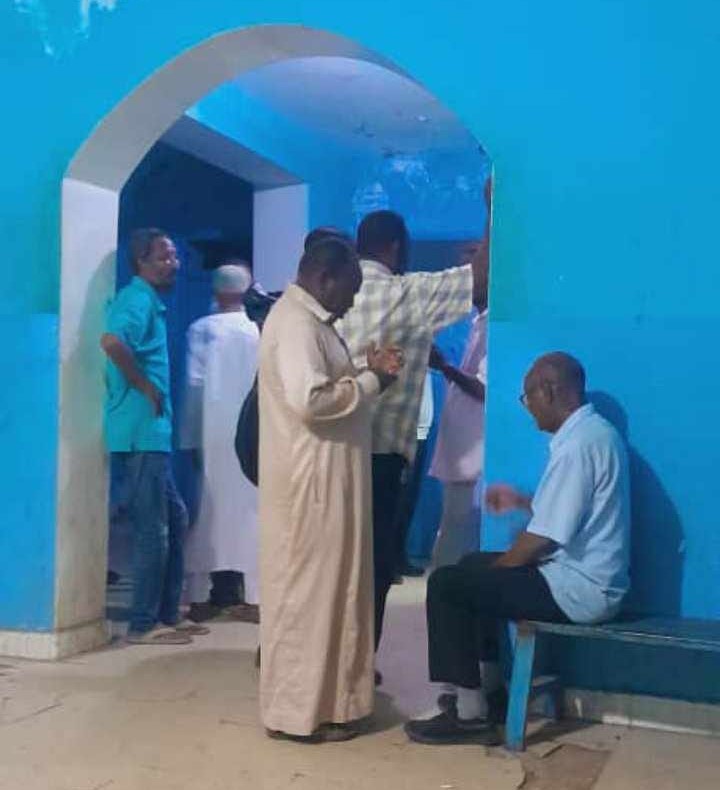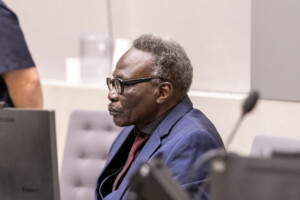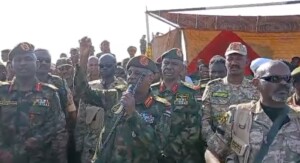Sudanese authorities detain activists in El Gedaref

Members of the Communist Party of Sudan at the police station in Ed Damazin, Blue Nile region, August 19, 2023 (File photo: Ed Damazin Resistance Committees Facebook page)
Military Intelligence in El Gedaref, eastern Sudan, detained four political activists in El Hawata on Sunday. Five people were also detained in El Mafaza last week.
A fellow activist from the town told Radio Dabanga that military intelligence officers detained Ezzeldin Hasan, Ali Hasan, Adel Fadlallah, and Omar El Jamri in the morning and took them to an unknown location.
There are unverified reports that they were transferred to the army headquarters in El Fao in the western part of the state.
Three of the detainees were taken from their workplaces and the fourth was taken from a café. The activist said he believes that the detentions were carried out following a Facebook post demanding an end to the war.
Last week, members of the El Gedaref General Security Service (GIS) detained five people in El Mafaza, including a teacher and two civil servants. They took them to El Hawata after two days of detention in El Mafaza.
A source from El Mafaza told Radio Dabanga that the security officers abused the detainees. “They were accused of belonging to the RSF and called fools,” he said. “Khaled Hamza, the director of the El Mafaza Primary School was kicked, slapped, whipped, and his hair was shaved*. They also accused him of profanity.”
Mahmoud Abdelgader, El Fateh Hussein, Financial Controller Abdelmonim Idris, and Administrative Officer Mohamed Awadelkarim were also beaten and tortured.
According to the source, the group was detained for posting on social media demanding an end to the war. The security officers reportedly accused them of belittling the SAF.
In April, several members of resistance committees and other activists were detained in El Gedaref city and Gala’a El Nahal. Activists explained to Radio Dabanga that Military Intelligence and the GIS collaborate to detain anyone who opposes the war or calls for its cessation.
On October 28, eight Sudanese civil society groups launched a campaign to highlight the issue of missing people in the country. The Sudanese civil society group, Missing Initiative, reported staggering documentation regarding the ongoing conflict in Sudan, detailing a total of 990 cases of enforced disappearances from the eruption of the conflict until its anniversary last month.
End December, a number of human rights groups and political bodies condemned the widespread detention campaigns by Military Intelligence and Islamist groups in Sudan against civil society activists. According to Osman Sirelkhatim, representative of the El Kalaklat and South Khartoum Emergency Rooms, detentions and torture aim to suppress the democratic civil forces seeking to stop the war through negotiations.
Resistance committees in El Dinder in Sennar in January accused members of the [dissolved] National Congress Party (NCP) of coordinating detentions with GIS and Military Intelligence units to detain people.
* Head shaving is seen as an attempt to “shave young people’s sense of power” and “humiliate us” in Sudanese activist circles. The Public Order Law, officially abolished in November 2019, gave the authorities the power to “maintain appearance in public places”.
** The predecessor of the General Intelligence Service (GIS), the National Intelligence and Security Service (NISS), was one of the most infamous and feared organs of the Omar Al Bashir regime, that acted ruthlessly against any political dissent. The NISS was officially disbanded in July 2019 following the ousting of President Al Bashir three months earlier. Several articles of the National Security Act of 2010 were amended, to restructure the security apparatus and adjust its competencies. The GIS was officially no longer authorised to detain people or carry out search operations. However, after the joint SAF-RSF coup d’etat in October 2021, Military Intelligence and GIS were given free powers of detention again. Reports of violent suppression of freedoms that characterised the 30-year Al Bashir regime returned at all levels of society.











 and then
and then